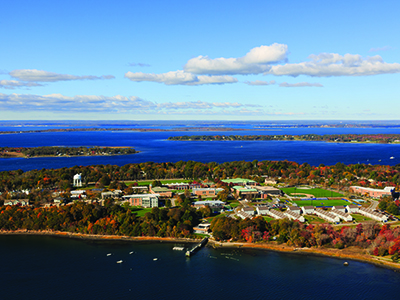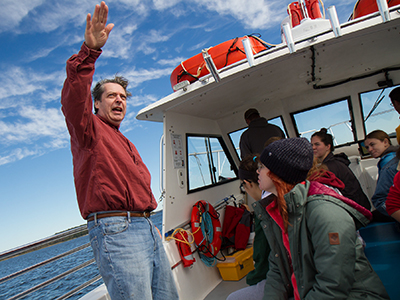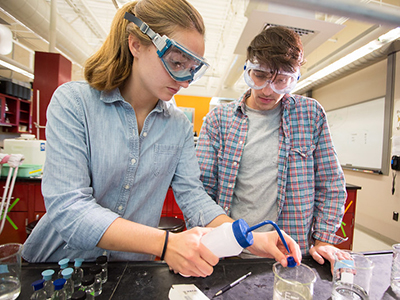Environmental Science
Housed in RWU’s Marine and Natural Sciences Building, the interdisciplinary Environmental Science program integrates biology, chemistry, earth science, and physics into an understanding of the natural world. Through research and an array of electives in fields like earth sciences, resource management and law, you’ll discover how humans affect nature and learn how to protect the environment in your career as a scientist, policymaker or educator. Our graduates go on to work on the forefront of climate change research and make a difference through science in action.
This major is coordinated by the Department of Biology, Marine Biology, and Environmental Science.
Learn on a Coastal Campus
 RWU’s coastal campus, situated in beautiful southern New England, serves as a natural laboratory for our coursework and research projects. Located just a few hundred yards from Mount Hope Bay in the Narragansett Bay watershed, the Marine and Natural Sciences (MNS) building grants our students and faculty rich opportunities to explore the patterns and processes that shape our on-campus wetlands, ponds, forests, old fields, and coastal ecosystems.
RWU’s coastal campus, situated in beautiful southern New England, serves as a natural laboratory for our coursework and research projects. Located just a few hundred yards from Mount Hope Bay in the Narragansett Bay watershed, the Marine and Natural Sciences (MNS) building grants our students and faculty rich opportunities to explore the patterns and processes that shape our on-campus wetlands, ponds, forests, old fields, and coastal ecosystems.
 Our local fieldwork is complemented by our MNS facilities, which house advanced laboratory resources. Research and coursework are also supported by RWU’s in-house Wet Lab, Shellfish Hatchery and Farm, Aquatic Diagnostic Laboratory, and greenhouse. On board RWU’s research vessel, the InVinceable Spirit, students launch from our own dock for coursework, water quality testing, or analysis of local ecosystems, and can be back on campus in time for their next class.
Our local fieldwork is complemented by our MNS facilities, which house advanced laboratory resources. Research and coursework are also supported by RWU’s in-house Wet Lab, Shellfish Hatchery and Farm, Aquatic Diagnostic Laboratory, and greenhouse. On board RWU’s research vessel, the InVinceable Spirit, students launch from our own dock for coursework, water quality testing, or analysis of local ecosystems, and can be back on campus in time for their next class.
Success By The Numbers

Placement of 2022 Grads
Our 2022 graduates found success in employment or in graduate school within 6 months of graduation.

Real World Opportunities
Biology and Environmental Science students participate in community-engaged projects and internships during their undergraduate, studies, giving them the skills and diverse experiences that are most desirable for employers and graduate school admission.

Hands-On Research
Each academic year, over 80 students conduction research with faculty and/or care for organisms in our labs. Students are encouraged to participate in research opportunities starting in their first year.
Degree Requirements
Environmental Science, B.A.
The Environmental Science major is an interdisciplinary program designed to develop an understanding of environmental processes and issues, and an awareness of our role as humans within the environment. The Environmental Science major encompasses several interrelated fields, including biology, ecology, chemistry, resource management, policy making, and natural science. Students graduating with this degree can expect to either proceed to graduate level study or enter the environmental workplace. A degree in environmental science presents numerous opportunities in the fields of resource management, ecological risk assessment, conservation biology and environmental education.
Students who declare Environmental Science majors must complete
Environmental Science majors pursuing the Bachelor of Science degree must complete two semesters of calculus and one semester of Biostatistics. The Bachelor of Arts degree requires a statistics class (
Environmental Science majors must satisfy all University Core Curriculum requirements and the College speech requirement,
Program Requirements
Required Courses
Foundation Requirements:
- ENVS 103 - Earth Systems Science and Lab
- ENVS 104 - Principles of Oceanography and Lab
- ENVS 203 - Humans, Environmental Change and Sustainability
- BIO 104 - Intro to Evolution & Ecology w/ Lab
- CHEM 191 - Principles of Chemistry I and Lab
- or
- CHEM 184 - College Chemistry I
- and
- CHEM 185 - College Chemistry II
- and
- CHEM 192 - Principles of Chemistry II and Lab
- or
- CHEM 186 - College Chemistry III
- MATH 250 - Introduction to Biostatistics
- and
- MATH 136 - Precalculus
Intermediate Level Requirements:
- BIO 240 - Concepts of Ecology *
- BIO 360 - Limnology and Lab
- Or
- ENVS 375 - Soil Ecology and Lab *
- CHEM 201 - Environmental Chemistry I and Lab
- and
- CHEM 202 - Environmental Chemistry II and Lab
- PHYS 109 - Physics I - Algebra based and Lab (B.A. degree)
- PHYS 110 - Physics II - Algebra-Based and Lab
Environmental Science Upper Level Electives:
Select five (5) courses chosen from list:
- ANSOC 250 - Culture and the Environment
- BIO 230 - Microbiology and Lab
- BIO 305 - Neotropical Marine Biology
- BIO 310 - Tropical Ecology
- BIO 312 - Conservation Biology
- BIO 326 - Field Ecology: Ecology of the Rockies
- BIO 332 - Fisheries Science
- BIO 341 - Ecology of Marine Natural Products
- BIO 342 - Marine Microbial Ecology
- BIO 360 - Limnology and Lab
- BIO 376 - Urban Ecosystems
- BIO 377 - Environmental Management & Health
- CHEM 312 - Instrumental Methods of Analysis and Lab
- CHEM 434 - Advanced Environmental Chemistry
- CIS 350 - Geographic Analysis of Data: An Introduction to GIS
- ENGR 320 - Environmental Engineering
- ENGR 340 - Sustainable Energy Systems
- ENGR 405 - Air Pollution and Control
- ENGR 407 - Solid and Hazardous Waste Management
- ENVS 301 - Marine Resource Management
- ENVS 310 - Biogeochemical Cycling
- ENVS 333 - Environmental Monitoring and Analysis and Lab
- ENVS 375 - Soil Ecology and Lab
- or
- BIO 375 - Soil Ecology
- ENVS 401 - Environmental Toxicology and Lab
- ENVS 469 - Environmental Internship
- and
- Three (3) free electives for B.S.
Note:
*Environmental Science majors may apply a maximum of two (2) courses from the major requirements towards minors in Biology or Marine Biology. Environmental Science majors may use a maximum of two (2) upper-level electives towards the elective requirements for majors in Biology or Marine Biology.
Students may only apply one short term study abroad course (BIO 305, BIO 310 or BIO 326) to the upper-level electives.
Environmental Science, B.S.
The Environmental Science major is an interdisciplinary program designed to develop an understanding of environmental processes and issues, and an awareness of our role as humans within the environment. The Environmental Science major encompasses several interrelated fields, including biology, ecology, chemistry, resource management, policy making, and natural science. Students graduating with this degree can expect to either proceed to graduate level study or enter the environmental workplace. A degree in environmental science presents numerous opportunities in the fields of resource management, ecological risk assessment, conservation biology and environmental education.
Students who declare Environmental Science majors must complete
Environmental Science majors pursuing the Bachelor of Science degree must complete two semesters of calculus and one semester of Biostatistics. The Bachelor of Arts degree requires a statistics class (
Environmental Science majors must satisfy all University Core Curriculum requirements and the College speech requirement,
Program Requirements
Required Courses
Foundation Requirements:
- ENVS 103 - Earth Systems Science and Lab
- ENVS 203 - Humans, Environmental Change and Sustainability
- ENVS 104 - Principles of Oceanography and Lab
- BIO 104 - Intro to Evolution & Ecology w/ Lab
- CHEM 191 - Principles of Chemistry I and Lab
- or
- CHEM 184 - College Chemistry I
- and
- CHEM 185 - College Chemistry II
- and
- CHEM 192 - Principles of Chemistry II and Lab
- or
- CHEM 186 - College Chemistry III
- MATH 250 - Introduction to Biostatistics
- and
- MATH 213 - Calculus I and Lab
- MATH 214 - Calculus II and Lab
- or
Intermediate Level Requirements:
- BIO 240 - Concepts of Ecology *
- BIO 360 - Limnology and Lab
- or ENVS 375 - Soil Ecology and Lab *
- CHEM 201 - Environmental Chemistry I and Lab
- and
- CHEM 202 - Environmental Chemistry II and Lab
- PHYS 201 - Physics I with Calculus and Lab
- and
- PHYS 202 - Physics II with Calculus and Lab
- or
Environmental Science Upper Level Electives:
Select five (5) courses chosen from list:
- ANSOC 250 - Culture and the Environment
- BIO 230 - Microbiology and Lab
- BIO 305 - Neotropical Marine Biology
- BIO 310 - Tropical Ecology
- BIO 312 - Conservation Biology
- BIO 326 - Field Ecology: Ecology of the Rockies
- BIO 332 - Fisheries Science
- BIO 341 - Ecology of Marine Natural Products
- BIO 342 - Marine Microbial Ecology
- BIO 360 - Limnology and Lab
- BIO 376 - Urban Ecosystems
- BIO 377 - Environmental Management & Health
- CHEM 312 - Instrumental Methods of Analysis and Lab
- CHEM 434 - Advanced Environmental Chemistry
- CIS 350 - Geographic Analysis of Data: An Introduction to GIS
- ENGR 320 - Environmental Engineering
- ENGR 340 - Sustainable Energy Systems
- ENGR 405 - Air Pollution and Control
- ENGR 407 - Solid and Hazardous Waste Management
- ENVS 301 - Marine Resource Management
- ENVS 310 - Biogeochemical Cycling
- ENVS 333 - Environmental Monitoring and Analysis and Lab
- ENVS 375 - Soil Ecology and Lab
- or
- BIO 375 - Soil Ecology
- ENVS 401 - Environmental Toxicology and Lab
- ENVS 469 - Environmental Internship
- and
- Three (3) free electives for B.S.
Note:
Environmental Science majors may apply a maximum of two (2) courses from the major requirements towards minors in Biology or Marine Biology. Environmental Science majors may use a maximum of two (2) upper-level electives towards the elective requirements for majors in Biology or Marine Biology.
Students may only apply one short term study abroad course (BIO 305, BIO 310 or BIO 326) to the upper-level electives.
Environmental Science Minor
Program Requirements
Required Courses
Environmental Science Upper Level Electives (total of 18 credits):
At least seven (7) credits:
- ANSOC 250 - Culture and the Environment
- BIO 230 - Microbiology and Lab
- BIO 240 - Concepts of Ecology
- BIO 305 - Neotropical Marine Biology
- BIO 310 - Tropical Ecology
- BIO 312 - Conservation Biology
- BIO 326 - Field Ecology: Ecology of the Rockies
- BIO 332 - Fisheries Science
- BIO 360 - Limnology and Lab
- BIO 375 - Soil Ecology
- BIO 376 - Urban Ecosystems
- BIO 377 - Environmental Management & Health
- CHEM 201 - Environmental Chemistry I and Lab
- CHEM 202 - Environmental Chemistry II and Lab
- CHEM 312 - Instrumental Methods of Analysis and Lab
- CHEM 434 - Advanced Environmental Chemistry
- ENGR 320 - Environmental Engineering
- ENGR 340 - Sustainable Energy Systems
- ENGR 405 - Air Pollution and Control
- ENVS 104 - Principles of Oceanography and Lab
- ENVS 301 - Marine Resource Management
- ENVS 310 - Biogeochemical Cycling
- ENVS 333 - Environmental Monitoring and Analysis and Lab
- ENVS 375 - Soil Ecology and Lab
- ENVS 401 - Environmental Toxicology and Lab
Note:
Students may only apply one short term study abroad course (BIO 305, BIO 310 or BIO 326) to the minor elective requirements.
Environmental Science learning outcomes:
- Explain and synthesize interdisciplinary environmental science concepts used to interpret patterns and processes in diverse social-environmental systems.
- Develop questions and hypotheses, and conduct experimental, field-based and descriptive research in basic, applied and interdisciplinary sciences.
- Use data, scientific literature, and evidence-based reasoning to analyze biological and environmental systems across spatial and temporal scales.
- Communicate scientific information verbally, in writing, and visually to diverse audiences including scientists and non-scientists.
- Discuss interactions between science and society, including environmental justice, ethical aspects of scientific research, and using evidence-based decision-making to propose solutions to important issues in society.
- Apply their knowledge and scientific competencies to their own personal and professional development, and to engage in their communities.
Learn from Expert Faculty
Dr. Loren Byrne
Professor of Biology and Environmental Science
Research Interests: Soil ecology, urban ecology, biodiversity studies, sustainability and ecosystem services
Student Research Opportunities: Investigations of soils, earthworm and arthropod communities on RWU campus; relationships between earthworms and biogeochemical cycling; effects of urban land cover management on ecosystems; sustainable landscape and building design and management
Research Opportunities 
The Environmental Science major at Roger Williams is an interdisciplinary program designed to provide students with an understanding of environmental processes and issues and an awareness of our role as humans within the environment. Undergraduate research is integrated into the Environmental Science curriculum, with opportunities for students to earn academic credit for doing research, to develop proposals and compete for small grants to fund their projects, and to present their findings at regional, national and international conferences. Our faculty have mentored student research in many areas, including water circulation patterns in Narragansett Bay, effects of urban landscapes on soil biodiversity, trophic ecology of jellyfish, and sediment analyses of Narragansett Bay.
Minor in Sustainability Studies
Sustainability Studies at RWU is all about seeking solutions to the Earth’s most pressing problems. By combining ideas from a variety of disciplines — from science and humanities to business, engineering and architecture — you’ll develop a deeper understanding of the complex relationships among environmental, social and economic issues that will help guide your decision-making in your career and as a 21st century citizen.
Intern at Leading Research Agencies, Organizations
Environmental Science students can earn college credit for their major by completing an internship. Our students have worked at leading environmental research agencies and advocacy organizations such as the Nature Conservancy, Save The Bay, World Wildlife Fund, R.I. Department of Environmental Management, and the Audubon Society of Rhode Island.
Study Abroad
Study Environmental Science in one of our short-term off-campus programs in Belize, Panama, and Yellowstone National Park. Students can also spend a full semester abroad at partner institutions in New Zealand and Australia.
Graduate Shares His Experience
"I did research at Roger doing water quality testing of the bay water. I was sampling water using professional methods and learned different ways of testing. That turned into an interest in water quality."
Sean Nugent '20
Water Quality Technician at SafeWell in Bolton, Mass.

